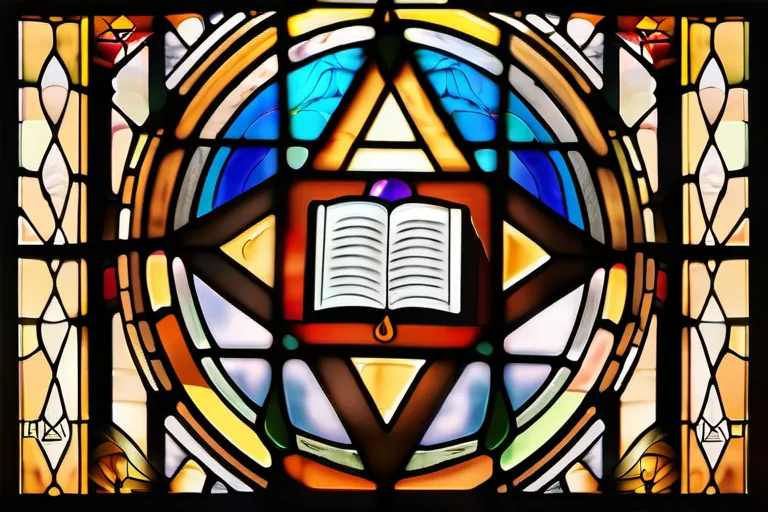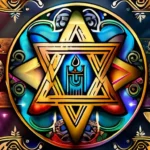Explore the role, attributes, and significance of the Messiah in Jewish beliefs.
The concept of the Messiah is a central belief in Judaism, representing the ultimate savior who will restore peace and justice to the world. In this article, we delve into the rich history, attributes, and role of the Messiah as understood by Jews.
The Historical Context of the Messiah
Understanding the concept of Messiah in Judaism takes us on a journey through time, tracing its roots to the ancient Hebrew Bible and early Jewish texts. How did this idea come into existence? Was it a response to political oppression, or a spiritual longing for redemption? The origins of the Messiah are deeply intertwined with the historical context of the Jewish people.
Imagine the Jewish exile as a metaphorical dark cloud hanging over the ancient Israelites. Could the prophets have seen this cloud as a harbinger of a future savior, a figure who would bring light and salvation to their troubled times? The idea of a Messiah began to take shape during the Babylonian Exile (6th century BCE), when the people were scattered far from their homeland and faced unprecedented hardships.
The concept of the Messiah is not a single, uniform entity in Jewish tradition. Rather, it encompasses various figures and roles, each with its own unique significance. Was Mashiach initially seen as a political leader who would liberate the Jews from foreign rule? Or was he envisioned more as a spiritual guide, one who would restore the House of Israel to its former glory?
The earliest texts that hint at the idea of the Messiah are found in the Tanakh, particularly in the prophetic books like Isaiah and Jeremiah. These texts paint a picture of a future leader who will usher in an era of peace, justice, and righteousness. But what exactly does this mean? Could it be as simple as a ruler who ends wars or as complex as a spiritual transformation that reshapes human nature?
As we delve deeper into the historical context, we see how the concept evolved over time. The Maccabean Revolt of the 2nd century BCE saw a surge in messianic expectations, with leaders like Judas Maccabeus being seen as potential saviors. Yet, even after the restoration of Jewish independence, the idea of an ultimate deliverer persisted.
The Messianic concept thus becomes a lens through which we can understand the complex interplay between religious and political aspirations in ancient Judaism. It is both a reflection of hopes for a better future and a catalyst for social and spiritual transformation. The role of the Messiah, therefore, extends beyond mere leadership; it involves a profound change in the very fabric of society.
By exploring these questions, we not only gain insight into the historical context but also uncover the enduring relevance of the Messiah concept in Jewish thought. It continues to inspire and challenge us, reminding us that even in darkest times, there is always hope for redemption and renewal.
Attributes of the Messiah
When we delve into the attributes of the Messiah, we’re essentially exploring the ideal human being who embodies the very essence of what it means to be a good and wise leader. In Judaism, this concept is not just about a single individual but also symbolizes an era of perfection and righteousness.
Imagine for a moment that you could have someone in your life who brings unparalleled peace and justice. Would you not see them as the ultimate savior? That’s precisely what the Messiah represents—someone who brings about universal harmony and fairness, where every person is treated with dignity and respect. This individual would be the epitome of wisdom, guiding people towards moral excellence.
In traditional Jewish beliefs, the Messiah must possess a set of specific qualities that go beyond mere physical or temporal existence. They include:
- Peace: The Messiah will bring about an end to all wars and conflicts, ensuring that peace prevails in every corner of the world.
- Justice: They would uphold a system where justice is served without bias or discrimination, treating everyone fairly regardless of their status or background.
- Wisdom: This leader must possess unparalleled wisdom, capable of guiding and uplifting humanity towards spiritual and ethical heights. Their teachings would be revered as the ultimate source of guidance for all mankind.
These attributes are not only about personal integrity but also about societal transformation. The Messiah is envisioned to usher in a new age where these qualities are not just ideals, but realities that shape daily life. It’s almost like painting a picture of a utopia, where every person can thrive and live their best life.
But here’s the intriguing part—these attributes don’t just apply to one specific individual; they represent a collective vision for humanity. The idea is that through the efforts of many individuals who embody these values, we can gradually work towards creating a world that mirrors the ideal state described in Jewish traditions.
The Role of the Messiah in Jewish Beliefs
The role of the Messiah in Jewish beliefs is like a lighthouse guiding a ship through stormy seas, offering hope and salvation to those who seek it. Could there be any greater symbol of redemption than one who brings peace and justice to all people? In Judaism, the concept of the Messiah is not just about an individual; it’s about a transformation, a turning point where the world as we know it is fundamentally changed.
Imagine a future where shalom, or perfect peace, reigns supreme. This is what many Jews yearn for, and they see the Messiah as the key to unlocking that future. The idea of a divine figure who will usher in an era of righteousness and harmony is both comforting and inspiring. But how does this concept evolve over time?
Throughout Jewish history, the notion of the Messiah has taken on various forms. From the early prophets who envisioned a king who would lead the people back to their homeland to later traditions that spoke of a divine redeemer, the idea has remained fluid yet persistent. Some believe in a single individual, while others see the Messiah as a collective effort towards a better world.
The role of the Messiah is also deeply intertwined with the concept of teshuvah, or repentance. It’s a reminder that change is possible and that every person has a part to play in bringing about a more just society. Could it be that the Messiah is not only a figure from the future but someone we can strive to become today?
In essence, the Messiah in Jewish beliefs stands as a beacon of hope, a symbol that no matter how dark the present may seem, there is always light at the end of the tunnel. It’s a promise that has kept generations of Jews hopeful and dedicated to creating a world where every voice matters and every soul finds its rightful place.
The Messiah in Jewish Traditions
The concept of the Messiah, often referred to as Mashiach in Hebrew, holds a significant place in Jewish tradition and beliefs. It’s intriguing how this idea has evolved over centuries, intertwining deeply with various religious observances like Passover and Hanukkah.
During Passover, we recall the Exodus from Egypt, where Moses led the Israelites out of bondage. But isn’t it fascinating to think about what might have happened if a deliverer had been present back then? The stories of the plagues and the parting of the Red Sea set up an almost messianic narrative, hinting at a powerful figure who could bring about salvation.
In Hanukkah, we celebrate the rededication of the Second Temple. The Maccabees’ victory over the Seleucids is another historical event that could be seen as a precursor to the arrival of the Messiah. The light of the Hanukkah candles symbolizes hope and resilience, reminding us of how even in times of darkness, there can be a spark of divine intervention waiting to shine through.
How do these traditions reflect the concept of the Messiah? In both Passover and Hanukkah, we find stories that speak of freedom, redemption, and the promise of a better future. The Messiah is not just a figure from the distant past; he is also a symbol for the present, offering hope to those who are suffering or oppressed.
When we think about the Messiah in these contexts, it’s like seeing pieces of a puzzle coming together. Each tradition adds another layer to our understanding, emphasizing that the path to redemption and peace is both historical and ongoing. The Messianic figure may be seen as a future deliverer, but his influence can also be felt through actions of kindness, justice, and faith today.
The Messianic Age
The concept of the Messianic Age is a cornerstone of Jewish eschatology, often described as a time when peace and prosperity will reign supreme on Earth. Imagine, for a moment, a world where conflict and suffering are but distant memories—wouldn’t that be akin to entering into a new chapter of human existence? In Jewish tradition, this period is believed to follow the arrival of the Messiah, marking the final fulfillment of God’s plan for humanity.
The Messianic Age is frequently likened to a golden era, much like the legendary Garden of Eden. It represents a time when all nations will live in harmony, and the Earth will be a place of abundant bounty and tranquility. How can one not yearn for such a world? The idea itself serves as a powerful beacon, guiding Jews through periods of adversity and providing hope for a better future.
In the context of Jewish history, the Messianic Age is often described in terms of its social justice dimensions. It promises an end to poverty, oppression, and inequality—qualities that resonate deeply within the hearts of those who strive for a more equitable world. The vision of this age isn’t merely about peace; it’s also about justice, equality, and the full realization of human potential.
Moreover, the Messianic Age is closely tied to the concept of aliyah, or the fulfillment of prophecy, where the Jewish people will return to their ancestral homeland. This return symbolizes not just a physical relocation but a spiritual rebirth—a reconnection with one’s roots and a renewed commitment to communal values.
Reflecting on the Messianic Age challenges us to dream big and work towards creating a more just society here and now. It is both a historical narrative and a call to action, inspiring Jews to strive for the best in humanity while waiting patiently for the fulfillment of this divine promise.
Contemporary Perspectives on the Messiah
How often do we hear about Zionism and the State of Israel in discussions about Jewish history and beliefs? Yet, how many times is the concept of the Messiah brought into these conversations? The idea of a future redeemer, or messiah, has played a significant role in both traditional and modern interpretations. In this chapter, we will explore how contemporary Jewish perspectives view the Messiah, particularly in the context of Zionism and the State of Israel.
Imagine a world where peace prevails, justice is upheld, and every individual lives with dignity and respect. This utopian vision has long been associated with the Messianic Age, but what about the figure who will bring about such a transformation? In modern times, some Jews see the Messiah as an integral part of their national narrative, intertwined with Zionism and the establishment of Israel.
The concept of the Messiah in contemporary Jewish thought is not just a spiritual ideal but also a political one. Some interpret his role as that of a national leader who will lead Jews back to their historic homeland and ensure their safety and sovereignty. Is this a fulfillment of biblical prophecy, or a modern-day solution to centuries-old struggles? The debate rages on.
Moreover, the relationship between the Messiah and Zionism is complex. Some argue that the establishment of Israel fulfills part of the messianic vision, while others maintain that true redemption can only come through spiritual transformation rather than political achievements. This tension highlights the diversity within Jewish thought regarding the role of the Messiah in modern times.
Considering all these perspectives, it’s clear that the concept of the Messiah remains a vital and evolving idea in Judaism. Whether seen as a spiritual leader or a political savior, his role continues to shape discussions about peace, justice, and national identity. As we navigate through the complexities of contemporary Jewish life, the Messiah’s legacy persists, serving as both a guiding light and a point of contention.
Conclusion
 The Messiah remains a powerful symbol of hope and redemption in Judaism. Understanding its significance can provide valuable insights into Jewish beliefs and traditions.
The Messiah remains a powerful symbol of hope and redemption in Judaism. Understanding its significance can provide valuable insights into Jewish beliefs and traditions.











